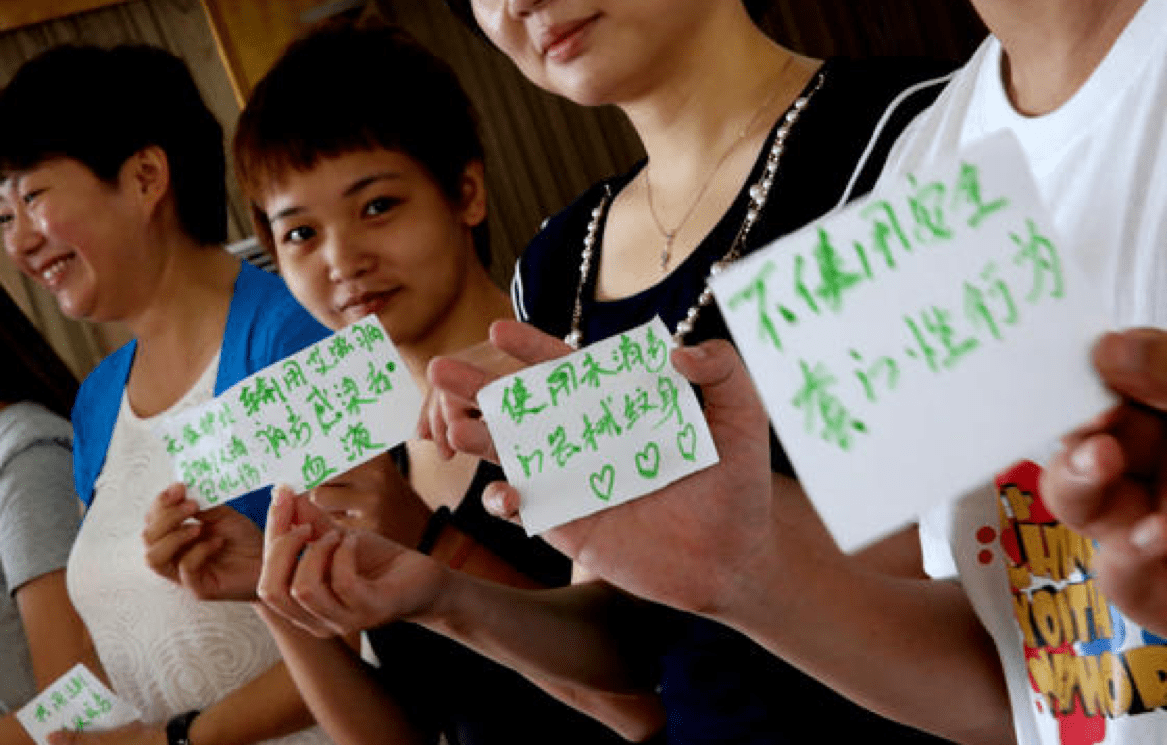Guiyang, July 19---- “Let’s get a room and have sex.” “If you love me, please respect me.” A young “couple” boldly performed a role-play of such a situation in front of 50 young people from across China. Through the role-play those involved hoped to discuss with their peers and learn how to make informed decisions in a relationship.
Supported by United Nations Population Fund (UNFPA) and the China Family Planning Association (CFPA), China Youth Network (CYN) invited more than 50 young peer education volunteers from more than 30 provinces and municipalities across China to attend a five-day national peer educator training camp hosted near Hongfeng Lake in Guiyang city. The participants came from colleges, communities and private companies, and they were all devoted to the cause of adolescent sexual and reproductive health. This was the second national peer education training camp that UNFPA supported together with CFPA and CYN in China.
China’s rapid development and transformation of social values have posed severe challenges to adolescent sexual and reproductive health, including unplanned pregnancy, unsafe abortion, sexually transmitted diseases and AIDS. A UNFPA-supported national survey showed that even though the majority of unmarried youths are open to having sex before marriage, less than five per cent can give all the correct answers to three basic questions about sexual and reproductive health, which include “a woman may get pregnant after having sex intercourse once,” “masturbation can cause serious health problems” and “induced abortion will not affect a woman’s pregnancy in the future.” Less than 15 per cent had the right answers to five questions on HIV/AIDS.
During the five-day training programme, trainers from CYN and the international Y-PEER organization engaged in peer education and discussed knowledge of sexual and reproductive health, as well as the approaches and skills needed to carry out peer education. The participants also had a heated discussion about how to improve team management to pursue the sustainable development of peer education. The aim of the programme was to mobilize more young people to join the network of peer educators on sexual and reproductive health throughout China.
The peer education volunteers were divided into five activity groups and had lively discussions about sexual and reproductive health, social gender, AIDS and other topics. With a particular focus on adolescent pregnancy, the theme of World Population Day this year, participants used brainstorming and other training methods to discuss how to avoid and handle unplanned pregnancy. The volunteers also delivered trial sessions, and received comments by experts and peers.
“Almost 80 per cent of the young people whom I have contact with have sex before marriage. Therefore, volunteers like us can help to disseminate knowledge of adolescent sexual and reproductive health. After this training camp, I will expand the team of peer education volunteers in my college and we hope to do outreach to young people working at hotels and restaurants nearby,” says Liu Mingyao, a college student from Tianjin.
Wang Yue, a social worker from Shanghai, shared a story of a 17-year-old girl who was pregnant unexpectedly. “This girl is a migrant worker. She was already pregnant for months when she found out. Her boyfriend moved to another city when he was told about her pregnancy, leaving her alone with worries of her uncertain future.
UNFPA attaches great importance to engaging with adolescents in China. In partnership with the Chinese government and organization including CFPA, UNFPA supports the development of youth groups including CYN. It has also supported the establishment of peer education teams in the pilot projects it supported in Hunan, Chongqing and Hainan.
Zhou Shuzhi, a college student from Yuzhong district, Chongqing city, has volunteered in UNFPA’s pilot project for more than a year. Every month she organizes two or three peer education training sessions for middle and primary school students, and takes their questions about sexual and reproductive health as well as how to deal with “early love”. “All the students and teachers who have been to our sessions value our work, and would like to see the programme continue,” She said that after this training camp, she will recruit more volunteers and encourage more young people to join the cause.


